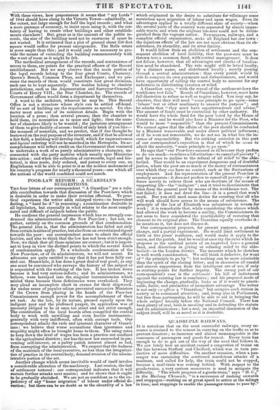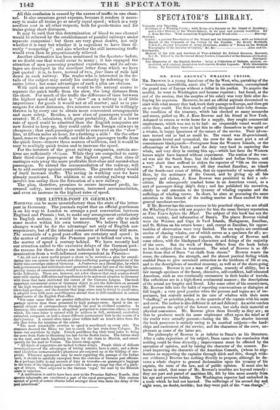QUADRUPLE RAILWAYS.
IT is notorious that on the most successful railways, every re- source is strained to the utmost in carrying on the traffic so as to prevent disasters ; so immense and almost unmanageable is the concourse of passengers and goods for transit. Every train has enough to do to get out of the way of the next that follows it. We saw lately how an accident caused a congestion of trains on the line between Stafford and Chelford, which was in turn pro- ductive of more difficulties. On another occasion, when a pas- senger was sustaining the continued murderous attacks of a madman, and called for help, the train could not be stopped, because a mail-train was coming behind. With respect to the goods-trains, a very curious manceuvre is used to mitigate the. difficulty. "The whole progress of a goods-train," says "H. C.," in the Railway Chronicle, "is a succession of rushing onwards and stoppages—rushing on at great speed to arrive at the sidings in time, and stoppings to enable the passenger-trains to pass by." All this confusion is caused by the excess of traffic in one chan- nel. It also occasions great expense, because it renders it neces- sary to make all trains go at nearly equal speed ; which is a very needless cost in all other respects, both for goods-trains and for trains going short distances.
It may be said that this determination of blood to one channel
would be relieved by the establishment of parallel railways under separate companies : but there are very great doubts, not only whether it is easy but whether it is expedient to have lines di- rectly " competing "; and also whether the still increasing traffic would even then be proportionately relieved.
Another alternative has been mentioned in the Spectator before, as no doubt one that would occur to many ; it has engaged the attention of men possessing practical experience, and its advan- tages are developed in the excellent letter from which we have just quoted : it is, to have, instead of two, four lines of rails laid down in each railway. The reader who is interested in the de- tails of the subject may satisfy his curiosity by referring to the entire letter ; but some advantages of such a plan are obvious.
With such an arrangement it would be the natural course to separate the quick traffic from the slow, the long distance from the short. For much of the traffic the difference of time between the highest speed and what is " slow " on a railway is of little importance : for goods it would not at all matter ; and as to pas- sengers for short distances, five minutes more would be willingly thrown in by every one to obtain more convenient arrangements and more safety. Besides, a new class of nassengers would be created : H. C. calculates, with great probability, that if a lower rate of speed could be admitted than the English companies are now forced to keep up, they could outdo the foreign railways in cheapness ; that each passenger could be conveyed on the "slow" line, at fifteen miles an hour, for a farthing a mile ! On the other hand, remove the goods traffic and the short passenger traffic from the quick lines—remove those sources of collision, and it would be easy to multiply quick trains and to increase the speed. For the interests of the great railway companies, certain mo- tives are sufficiently obviuus. While they are compelled to carry their third-class passengers at the highest speed, that class of carriages eats away the more profitable first-class and second-class passengers. To extend the accommodation of the railway, will he to add security against competition. The greater safety would of itself increase traffic. The saving in working cost we have already mentioned. The addition to an existing railway would involve less outlay than the formation of a new railway. The plan, therefore, promises to secure increased profit, in- creased safety, increased cheapness, increased accommodation, and even an increase in the highest rates of speed.



























 Previous page
Previous page